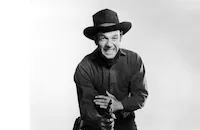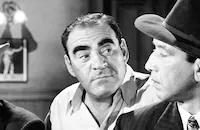Deep Valley

Brief Synopsis
Cast & Crew
Jean Negulesco
Ida Lupino
Dane Clark
Wayne Morris
Fay Bainter
Henry Hull
Film Details
Technical Specs

Synopsis
Libby Saul lives with her estranged parents on an isolated farm near the California coast. Used as a go-between by her parents, who no longer speak to each other, Libby has developed a stammer and spends her days wandering the woods with her dog, Joe. One day she encounters a crew of convicts building a road along the coast and, unknown to her parents, watches them for several days. She is especially interested in Barry Burnett, one of the convicts. After the road workers blast through the surrounding hills, they arrive at the farm in search of water from the farm well. Mr. Saul first offers to sell it to them, but when they turn down the offer, he agrees to let them have it for free. When Barry punches the road boss, who has been goading him, and is handcuffed, Libby breaks down in tears. At Saul's urging, Jed Barker, the engineer, who is fresh out of the army, visits the farm one evening. Libby's mother encourages her to befriend Barker. During their conversation, Libby learns that Barry is going to be sent back to San Quentin for attacking the road boss. Barker then asks Libby to go dancing, but she is too shy and runs away from him. After Barker leaves, an angry Saul slaps Libby and, telling her parents that she does not want to live in hatred as they do, she leaves home. With Libby gone, Mrs. Saul is forced to get dressed and comes downstairs for the first time in years. Meanwhile, Libby and Joe make themselves at home in a nearby cabin. A short time later, Barry, having escaped during a heavy rainstorm, joins her, and Libby offers to help him. Barry tells Libby that while in the Navy, he was imprisoned for fighting. Later, he was sent to San Quentin for manslaughter after a man was killed during a robbery he committed while drunk. Libby and Barry plan to go to San Francisco together, and in preparation, Libby returns to the farm to get clothes and food. She discovers that her parents have reconciled and also learns that a posse has been formed to search for Barry. Her attempts to return to the cabin are thwarted, and Barry comes to the farm late at night looking for her. Libby hides him in the barn, and soon, happily in love, she is a changed woman. Barker almost discovers Barry's hiding place when Saul sends him after a tire pump, but Libby rushes ahead of him and Barry is safe for the moment. Later, however, Mrs. Saul begins to suspect the truth and confronts the couple. Barry and Libby run off just as Saul and Barker drive up. Barker tries to stop them, but Barry hits him over the head and drives off in the truck, leaving Libby behind. Barry is wounded by the posse and dies in Libby's arms. Later, Libby and Barker make a new start.

Director

Jean Negulesco
Cast

Ida Lupino

Dane Clark

Wayne Morris

Fay Bainter

Henry Hull
Willard Robertson
Rory Mallinson

Jack Mower
Bob Lowell
Lennie Bremen
Ross Ford

John Alvin
William Haade
Clancy Cooper
Ian Macdonald

Ray Teal

Ralph Dunn
Eddie Dunn
Harry Strang
Crew
Stephen Morehouse Avery
Henry Blanke
Murray Cutter
Frank Durlauf
Leo F. Forbstein
H. F. Koenekamp
Art Lueker
Owen Marks
Frank Mattison
John Maxwell
Ted Mccord
William Mcgann
Bernard Newman
Max Parker
C. A. Riggs
Max Steiner
Salka Viertel
Jack L. Warner
Perc Westmore
Howard Winterbottom

Film Details
Technical Specs

Articles
Deep Valley
Lupino completed her term at the studio with Deep Valley, a minor but fascinating role as a poor, uneducated young woman, abused by her parents and suffering from a debilitating stammer. Removed from any social interaction by her life on a farm, the only love and companionship she knows is with her faithful dog until she catches a glimpse of a convict working on a road gang. When he escapes into the woods, she takes him in and hides him from her family and the posse hunting for him. Together they create a briefly idyllic but doomed life apart from the rest of the world.
Deep Valley was relatively overlooked in its day. Critics derided its similarities to an earlier Lupino vehicle with Humphrey Bogart, High Sierra (1941), some of them noting similarities to Tobacco Road (1941) and even the British novel Cold Comfort Farm. Audiences mostly stayed away, which was too bad, because the film featured one of her most interesting performances, the kind for which she was uniquely suited, with an affecting screenplay by Salka Viertel and Stephen Morehouse Avery.
The picture had originally been announced for Humphrey Bogart, Ann Sheridan, and John Garfield in 1942. The script was dusted off only to save the studio from having to pay Lupino even when she was idle. Her terms with Warners dictated she was to be paid for a set number of periods per year, whether or not she was making a picture. A scheduling gaffe meant that the deadline for her first check, May 1946, had come and gone without an assignment, and she was paid $20,000. A second deadline in August also passed with no film on the docket, and the star happily went about taking on lucrative radio guest spots instead. To save themselves from yet another free check, the studio quickly put Deep Valley into production in September.
Director Jean Negulesco, who would later move to Fox for a series of glossy widescreen productions, was under contract to Warners at this time, helming dark dramas for Garfield, Joan Crawford, Peter Lorre, and Sydney Greenstreet. He gave Deep Valley some very effective atmosphere, aided by location shooting at Big Sur and Big Bear (a decision resulting from a strike that prevented filming on the back lot at Warners according to modern sources). However, press material at the time claimed the film was to be shot at Big Bear and Hermosa Beach. It proved to be a grueling shoot for Lupino. Scenes supposedly set in summer were shot in the cold mountain air, and Lupino, clad only in a cheap wardrobe of jeans and workshirt, caught a bad cold. For another shot, she was running barefoot over rocks by Bartlett Cedar Lake when she sliced her toe, developing a serious infection that caused her ankles to swell. Despite intense pain, she insisted on continuing the production without further delays, even after she suffered a flare-up of her chronic bronchitis. Just before Christmas she strained her back and had to be carried from the set on a stretcher. Ever the trouper, she received an injection of a pain killer and returned to complete the day's work. The principal photography on Deep Valley was finally completed on January 25, 1947, forty days behind schedule. Having already refused Warner's contract ultimatum, she packed her dressing room and bitterly exited the studio.
The more favorable reviews for Deep Valley gave it the credit it was due as a "first-class melodrama" with a performance from its leading lady that was "one of the finest...she has ever turned in." They also praised the work of Dane Clark, getting his first real acting lead opportunity after supporting roles in Hollywood Canteen (1944), Pride of the Marines (1945) with John Garfield, and the Bette Davis drama A Stolen Life (1946). Lupino's emotionally detached parents are played by Oscar® winner Fay Bainter and Henry Hull, who had created the role of shiftless patriarch Jeeter Lester in the Broadway production of Tobacco Road.
Screenwriter Salka Viertel is probably best known as Great Garbo's closest friend and confidante (many have said her lover) and the writer of five Garbo vehicles between Queen Christina (1933) and the actress's final film Two-Faced Woman (1941). Reportedly William Faulkner did some uncredited work on the script for Deep Valley.
The moody noir-like cinematography is by Ted McCord, who following Deep Valley, shot The Treasure of the Sierra Madre (1948) and Negulesco's next picture, Johnny Belinda (1948). In addition to the latter film, McCord received Academy Award nominations for Two for the Seesaw (1962) and The Sound of Music (1965), which is far removed from the noir world of Deep Valley.
Director: Jean Negulesco
Producer: Henry Blanke
Screenplay: Salka Viertel, Stephen Morehouse Avery, based on the novel by Dan Totheroh
Cinematography: Ted McCord
Editing: Owen Marks
Art Direction: Frank Durlauf, Max Parker
Original Music: Max Steiner
Cast: Ida Lupino (Libby Saul), Dane Clark (Barry Burnette), Wayne Morris (Jeff Barker), Fay Bainter (Ellie Saul), Henry Hull (Cliff Saul).
BW-106m. Closed Captioning.
by Rob Nixon

Deep Valley
Quotes
Trivia
Notes
Press material included in the file on the film at the AMPAS Library adds the following information about the production: Ann Sheridan, Humphrey Bogart and John Garfield were to star in the film. Scenes were shot on location at Hermosa Beach and Big Bear Lake, CA. Modern sources, however, claim that Deep Valley was filmed at Big Sur in Northern California, due to a studio strike.















